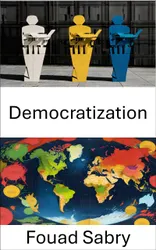Explore the Copenhagen School's revolutionary approach to International Relations with this essential guide. Delve into security studies that go beyond traditional military concerns, focusing on non-military threats and the social construction of security. This book provides an in-depth look at the Copenhagen School’s core concepts and their implications for global security.
Chapter Overview:
1. Copenhagen School: Foundations and impact on security studies.
2. Barry Buzan: Key contributions and influence on security discourse.
3. Ole Wæver: Securitization and its effect on security threat perception.
4. Securitization: Framing security issues beyond military concerns.
5. Thomas Diez: Insights into regional and global security dynamics.
6. Societal Security: Non-military threats and their impact on societies.
7. Regions and Powers: Interaction within the Copenhagen School’s framework.
8. European Security Order: Evolution and implications for stability.
9. International Political Sociology: Broader implications of the Copenhagen School.
10. Ethnic Identity in Iran: State security and ethnic identity.
11. International Security: Copenhagen School’s impact on global security policies.
12. Environmental Security: Construction and perception of environmental threats.
13. Copenhagen School: Key concepts and their relevance today.
14. Maritime Security: Perspectives and implications for global policies.
15. Copenhagen Peace Research Institute: Role in advancing theories.
16. Jaap de Wilde: Contributions and impact on security studies.
17. Security Dialogue: Importance in the Copenhagen School’s framework.
18. New Analytical Frameworks: Innovative approaches to contemporary security issues.
19. Identity, Migration, and Security in Europe: Intersection with the new security agenda.
20. Regional Security Complex Theory: Relevance within the Copenhagen School.
21. Amitav Acharya: Perspectives on international relations and their alignment with the Copenhagen School.
This book offers valuable insights for professionals, students, and enthusiasts, enhancing understanding of the evolving field of international security.
























